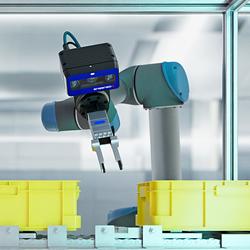RoboSense Wins GOLD 2019 Stevie Award
-American Business Award for Ground-Breaking Autonomous Driving LiDAR Technology -Wins Gold Award in “Transportation Category” for RoboSense Automotive Grade MEMS LiDAR Perception System for Safer Level 3-Level 5 Autonomous Driving at a Fraction of the Cost
RoboSense (Suteng Innovation Technology Co., Ltd) www.robosense.ai, a leader in LiDAR perception technology solutions, announced today that it has won the GOLD 2019 Stevie® Award in the "Transportation Category" for the RoboSense Automotive Grade MEMS LiDAR Perception System. The award will be given out at the 17thAnnual Stevie Awards - American Business Awards®, to be held in NY City on June 11, 2019.
The RoboSense Automotive Grade MEMS LiDAR Perception System is a revolutionary automotive solution that makes autonomous driving safer, easily mass produced, and lower cost. In addition to the Stevie Award, the RoboSense system is a CES 2019 Innovation Award winner. The system includes automotive grade MEMS solid-state LiDAR RS-LiDAR-M1 and RoboSense's unique perception RS-LiDAR-Algorithms for a complete system that lets the vehicle understand the road environment for safer autonomous driving. RoboSense's system offers ground-breaking mass production-ready hardware and software based vehicle environmental perception to support Level 3 to Level 5 autonomous driving at a fraction of the cost.
In preparation for autonomous vehicle mass market growth, RoboSense recently launched the Smart Sensor System (SSS), which combines RoboSense LiDAR sensors, AI point cloud algorithms, and an IC design for chip development. Created for four key smart transportation vehicle applications: autonomous passenger cars, low-speed autonomous vehicles, high-speed RoboTaxis, and V2R (Vehicle to Road infrastructure), the RoboSense Smart Sensor System is a smarter information interpreter that collects and interprets environmental information in one-stop for safer and more intelligent autonomous driving.
Stevie Award Judges Say RoboSense System "will take autonomous driving to the next level" "Impressive product with great growth potential"
A Stevie Award judge said the "MEMS LiDAR Perception System costs 1/500th the cost of mechanical LiDAR and provides higher resolution and better field of view. With intelligence perception algorithms, it can clearly recognize small objects, such as railings and fences and works in all weather conditions and at night and has no blind zone. It is automotive grade and has longer detection distance, making it ideal for autonomous solutions." Another judge said it is "the best performer in the category and will take autonomous driving to the next level." And another judge concluded, the RoboSense System is "Innovative technology which cuts costs and improves performance greatly. This has everything in its favor and offers the complete package for next generation vehicles."
More than 3,800 nominations from organizations of all sizes and in virtually every industry were submitted this year for consideration in a wide range of categories. The American Business Awards are the U.S.A.'s premier business awards program. More than 200 professionals worldwide participated in the judging process to select this year's Stevie Award winners.
"We are honored to be recognized by the prestigious American Business Awards for our innovative LiDAR technology that propels autonomous driving into mass production for use by everyone, from passenger cars, RoboTaxis, logistics vehicles, shuttle buses, and more," said Mark Qiu, Co-Founder & COO, RoboSense.
"The nominations submitted to The 2019 American Business Awards were outstanding. They illustrate the continued vibrancy of innovation and high level of achievement across the American economic landscape," said Michael Gallagher, president and founder of the Stevie Awards.
About RoboSense
RoboSense (Suteng Innovation Technology Co., Ltd.) is a world leading LiDAR environment perception solutions provider and developer of LiDAR hardware, AI point cloud algorithms, and IC designs. Founded in 2014, RoboSense has over 500 employees in six locations, including the U.S., Shenzhen, Beijing, Shanghai, and Germany. Focusing on the strategic deployment of smart sensor systems, RoboSense has developed a variety of application solutions based on LiDAR hardware technologies and algorithms. In five years, RoboSense has already released 18 products and technical solutions, and has applied for more than 400 patents.
RoboSense has a variety of product lines, including MEMS solid-state LiDAR and Mechanical LiDAR smart sensor systems. Customers include the world's major autonomous driving technology companies, automotive OEMs, and Tier 1 suppliers. RoboSense LiDAR solutions have been widely used in various application scenarios, such as self-driving logistics vehicles, buses, passenger cars, and more. For more information, see https://www.robosense.ai.
About the Stevie Awards
Stevie Awards are conferred in seven programs: the Asia-Pacific Stevie Awards, the German Stevie Awards, The American Business Awards®, The International Business Awards®, the Stevie Awards for Women in Business, the Stevie Awards for Great Employers, and the Stevie Awards for Sales & Customer Service. Stevie Awards competitions receive more than 12,000 entries each year from organizations in more than 70 nations. Honoring organizations of all types and sizes and the people behind them, the Stevies recognize outstanding performances in the workplace worldwide. Learn more about the Stevie Awards at http://www.StevieAwards.com.
Featured Product

